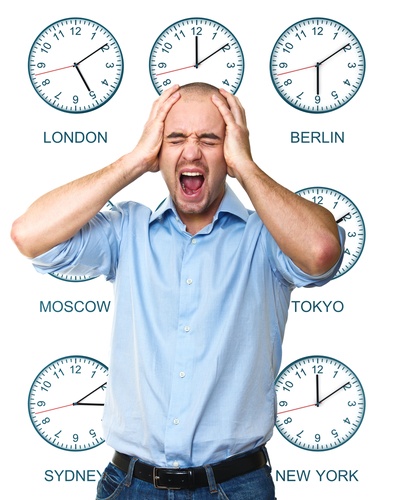
Jet lag happens when you travel across different time zones. Your internal clock is also known as the circadian rhythm is affected, interfering with your sleep and wake-up times. Your body has a way of resetting the internal clock and adjusting to the new time zone. However, time is not always a luxury especially when it is a quick trip.
So, how do you ensure that you are able to transition quickly and be up and running as quickly as possible? Here are four ways you can cope with jetlag.
Rehearse your new schedule beforehand
It helps to start adapting to your new time zone before getting to your destination. For instance, you can start adjusting your bedtime a few days before you travel. If you are traveling east, move your bedtime half an hour earlier, and vice versa if traveling west. In addition, try to match what is happening in your destination while on your flight. If it is daytime in your destination, try and stay awake even if it is nighttime where you are. If it is nighttime at your destination, try to get some sleep on the flight.
Of course, it is not easy to quickly switch. You might need a little help. For starters, try setting your clock to correspond with the time in your destination. This helps set the mind on what you would be doing in your destinations. You can also carry items such as noise-canceling headphones, earplugs, travel pillows, and eye masks to help you sleep easily and comfortably.
Avoid napping when you land
It is highly likely that you will be fatigued when you land or sleepy if you didn’t get sleep during the flight. However, if you reach your destination when it is daytime, you need to avoid napping at all costs. Napping can have a negative effect when trying to sleep later at night.
If the urge is too much, you can distract yourself by moving around. For instance, you can hire a car to start exploring the city. However, to do this, you would need to have an international driver’s license that allows you to drive in a foreign country. This permit has your photo, name, and driver information translated into 10 different languages. In case you run into a language barrier challenge on the road, this document can come in handy.
If you are wondering about how to get an international driver license, it is a simple and affordable process. You only need to have a valid driver’s license, two passport pictures, a filled application form, and a permit fee. You can take or email the requirements to AAA or AATA, the only organizations authorized by the U.S Department of State to issue IDPs.
Use light therapy
Exposure to light reduces the production of melatonin hormones responsible for making you sleep. If you need to start your day early, exposing yourself to more light in the morning suppresses the production of the melatonin hormone, reducing sleep significantly. On the other hand, if you need to stay awake late into the night, expose yourself to more light at night.
There are special lights used to reduce the effects of jetlag in the form of lamps, lightboxes among others. You can invest in some of these to help you when natural light is limited.
Use melatonin supplement
Just as you can trigger your body to reduce the release of melatonin, you can give your body a boost in the production of the same. Your body naturally produces this hormone when it is ready to sleep. However, your body’s internal clock gets affected during travel as said earlier. It is highly likely that your body will not be ready for sleep when the time for you to sleep comes. In this case, you can use a melatonin supplement to increase the melatonin hormone in the body. This in turn triggers sleepiness when you need it. However, it is important that you talk to your doctor before using it.
Conclusion
Sometimes the effects of jet lag can be too much especially if you are not a frequent traveler. Nevertheless, your trip doesn’t have to be unpleasant. The above tips can help alleviate jet lag symptoms for a successful trip. If they don’t work for you, consider seeing a doctor prescribe some medication for you.
For most travelers, jet lag is easily remedied after a few days in a new location. However, if your trip is only a few days long before you plan on returning home, it is often best to maintain your regular schedule so that you’re not once again readjusting to a new time when you arrive back home shortly.
For frequent flyers, pilots, flight attendants, and airline crew, jet lag can become a recurring problem. If you fit into this category of flyers, you may want to consult with a sleep specialist. Sleep specialists are highly trained in helping people shift their circadian rhythms by offering advice and prescriptions for a variety of treatments including bright light therapy, melatonin supplements, and other medications.
At the Alaska Sleep Clinic we help thousands of Alaskans combat their sleep disorders and problems every day. If you’re concerned about the impact on your health from frequent flying and are looking to speak with one of our sleep experts, click the link below for a free 10 minute phone consultation.













